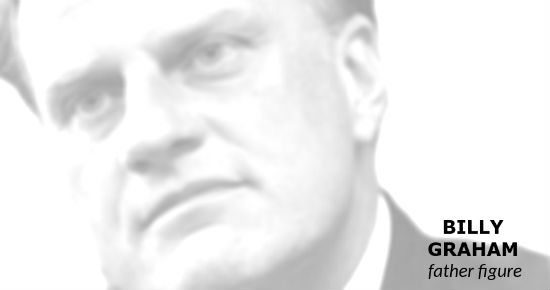From May 17, 2016, “Billy Graham and the rise of the religious right“:
You may have seen Balmer recently on late night TV (or on YouTube, because that’s how late-night TV works now), when he was featured in a Samantha Bee’s fiercely funny segment on the history of the religious right:
Bee’s segment has all the subtlety you might expect from a show called Full Frontal, but it ain’t wrong.* She offers a snarky, entertaining crash course in Balmer’s ever-more-convincing thesis about the rise of the religious right. Somebody on the Full Frontal writing staff has been reading Balmer (and maybe also sometimes this blog, as Bee’s abortion-as-retroactive-proxy-for-opposition-t0-civil-rights theme is happily familiar).
Bee’s comedy segment is relevant to the academic discussion at Syndicate because she allows us to see the fruit of Billy Graham’s behind-the-scenes politicking as it played out in the 1980 election. Here’s Balmer’s account of Graham’s role in that process:
Long before the 1980 campaign, Graham convened a dozen fellow preachers in Dallas for “a special time of prayer” and talk about the upcoming presidential campaign. Carter’s liaison for religious affairs had only recently returned from a visit to the evangelist’s home in Montreat, North Carolina, with a report that Graham “supports the President wholeheartedly.” But that support was apparently less than robust. The Dallas guest list, formulated by Graham himself, included his brother-in-law, Clayton Bell; Rex Humbard and James Robison, both of them televangelists; and a roster of well-known Southern Baptists: Charles Stanley, Jimmy Draper, and Adrian Rogers, the new president of the Southern Baptist Convention, who had recently visited Carter at the White House and declared it “one of the highlights of my life.” The ministers, gathered at Graham’s behest, occupied nearly an entire floor of the hotel. “It really was Billy’s meeting,” Robison recalled. “What he wanted us to do was pray together for a couple of days and to understand something very significant had to happen.” The unmistakable subtext of the gathering was the need to rally behind someone who could mount a challenge to Carter. The upshot of the meeting was an overture to Reagan encouraging him to challenge Carter for the presidency.
The James Robison quoted there is the same culture-war flamethrower shown in Bee’s segment, the guy who says this, as candidate Reagan smiles and applauds: “I’m sick and tired of hearing about all the radicals, and the perverts, and the liberals, and the leftists, and the Communists coming out of the closet. It’s time for God’s people to come out of the closet, and the churches, and change America!”
(Robison invested that word “radicals” with as much fear-inducing danger as he could, but, still, it seems less inherently insulting than most of the religious right’s other euphemisms for black people.)
In Wacker’s response to Balmer, he cordially disagrees with the idea that Billy Graham played much of a role in the rise of the religious right:
Is Graham responsible for the rise of the Christian Right? The answer is partly yes, but mostly no. Clearly he helped create the public space that it came to inhabit. Yet Graham himself stayed out of it, refusing to endorse its aggressive partisanship and narrowness of vision. … Should he be charged with the sins of his successors? I think not.
Note what Wacker here does not and cannot disagree with: the creation of the religious right is a matter of blame. “The sins of his successors” are, indubitably, sins, and Wacker is not inclined to try to defend them.
But he does minimize those sins, characterizing them as simply “aggressive partisanship and narrowness of vision.” That’s not quite responsive to Balmer’s charge. Balmer isn’t bemoaning an overly aggressive tone or “narrowness of vision,” he’s pointing out that the religious right is hateful, racist, misogynist, and nationalist. That’s why the Robison clip in Bee’s piece matters here — it shows us what they’re both describing. And what we see supports Balmer’s description more than Wacker’s.
Their different assessment of the severity of the “sin” of the religious right is reflected in their different assessments of Billy Graham’s complicity in it. For Wacker, it is unfortunate that Graham “helped create the public space that it came to inhabit.” But for Balmer — and for me — that’s a bigger failing. In our view, Graham helped create a public space that was hospitable to the anti-feminist, anti-civil-rights, anti-gay, anti-poor viciousness of the religious right. That suggests that there was something about Graham’s gospel theology that was able to accommodate such oppressive hatefulness or, at best, that there was nothing in Graham’s gospel theology that was explicitly opposed to it.
* The one aspect of Bee’s history lesson that I’d challenge would be the rehashing of the conventional wisdom about a 50-year fundamentalist retreat from politics after the Scopes trial and the repeal of Prohibition. It’s true that white fundamentalists weren’t trying to influence national politics from the top down during those years, but white fundies were still very active against everyone from FDR to MLK. Maybe we didn’t see Jerry Falwell saying, as he later would, that getting (white) Christians registered to vote was an essential mission for the church, but from the ’30s through the ’80s, white fundamentalists were extremely active in preventing black Christians from being able to do so.
Read the whole post here.













